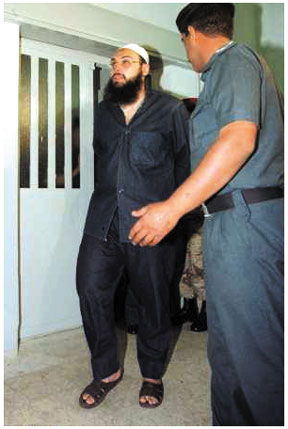Accused terrorist on trial in Jordan attended classes at Sac State

Image: Accused terrorist on trial in Jordan attended classes at Sac State:Courtesy Photo/Associated Press:
November 27, 2001
He was a typical California student. Born in San Jose Dec. 3, 1968, Raed Hijazi eventually attended Sacramento City College, took a Sacramento State extension course in the spring of 1988, then began attending Sac State as a full-time business major in the spring of 1989.
Hijazi enrolled in five classes that first semester, including three upper division business classes, and earned a 2.43 grade point average, according to his transcript. He returned in the fall, took 15 units, withdrew from one class and finished the semester with a 1.65 grade point average. That fall marked the end of the 21-year-old?s studies at Sac State and, like so many other students, he faded into oblivion without appearing in the college yearbook or in the alumni directory.
But Hijazi?s life has changed drastically in the past 12 years. On Monday, he pleaded innocent in a Jordanian court to nine charges, including “possession of arms and explosives and conspiring to carry out terrorist attacks against American and Israeli targets” during millennium celebrations nearly two years ago, according to an Associated Press report from Jordan.
Local NBC affiliate KCRA3, in addition to several other news sources including CNN and The New York Times, recently reported that Hijazi has possible connections to Osama bin Laden, the man suspected of plotting the Sept. 11 attacks on Washington and New York. In addition, U.S. Customs officials found evidence of financial transactions between Hijazi and Nabil al-Marabh, a man being held in connection with the Sept. 11 attacks.
Hijazi was first tried in absentia last year, because he could not be found at the time of his trial, according to the Jordan Times. In September 2000, he was sentenced to death for the millennium bomb plots. According to a CNN report, Hijazi “was apprehended in Damascus on Oct. 1 (2000) and was later extradited to Jordan.” Under Jordanian law, he may be retried, and that trial began in September.
Although Hijazi pleaded innocent Monday, an Oct. 24 article in the Christian Science Monitor cited a Jordanian government prosecutor who confirmed that Hijazi had admitted to plotting to bomb a hotel containing hundreds of American and Israeli tourists. He supposedly bragged that “there wouldn?t be enough body bags in all of Jordan to carry away the dead.”
Hijazi has since claimed that he was tortured in prison and forced to confess, according to a Sept. 5 Jordan Times article.
What happened to Hijazi in the 10 years between the time he left Sac State and when the millennium plot was uncovered is still not clear. However, one possibility is that Hijazi became involved in terrorist activities while at Sac State.
“[Hijazi] told prosecutors that he had been converted to the Islamic cause while studying business at California State University in Sacramento,” read a New York Times article by Judith Miller.Why Hijazi might have gotten involved with potential terrorists is a mystery, although Miller wrote that he became involved with a Sacramento group called the Islamic Assistance Organization after attending a mosque.
“It was there, he told Jordanian investigators, that he met a Muslim from the Fiji islands who schooled him in radical Islamic philosophy and persuaded him to go to Afghanistan,” Miller wrote in the Jan. 15 article.
Whether that report is accurate is not known, but Mohamed Hamada, president of the Sac State Muslim Student Association, thought it was false. He had no knowledge of any such organization, and neither did his faculty adviser.
“Mosques don?t send people to other countries,” Hamada said, adding that neither he nor his faculty adviser had ever heard of the radical group.
Imam Hamdani of the Islamic Center of Sacramento has been in Sacramento since 1975 and also said he had no recollection of a group like the one described by Miller. Calls to several other mosques in the Sacramento area were not returned.
Officials and faculty members at Sac State didn?t recognize Hijazi?s name, although one professor did recognize his face when shown a copy of Hijazi?s 1997 Boston cab driver?s license.
“His face is familiar, but I cannot remember anything about him,” said Ayad Alqazzaz, who taught a sociology class taken by Hijazi in the 1989 winter inter-session. “You remember the ones who talk in class and ask questions,” he said.
This article was updated Nov. 28, 2001.























































































































